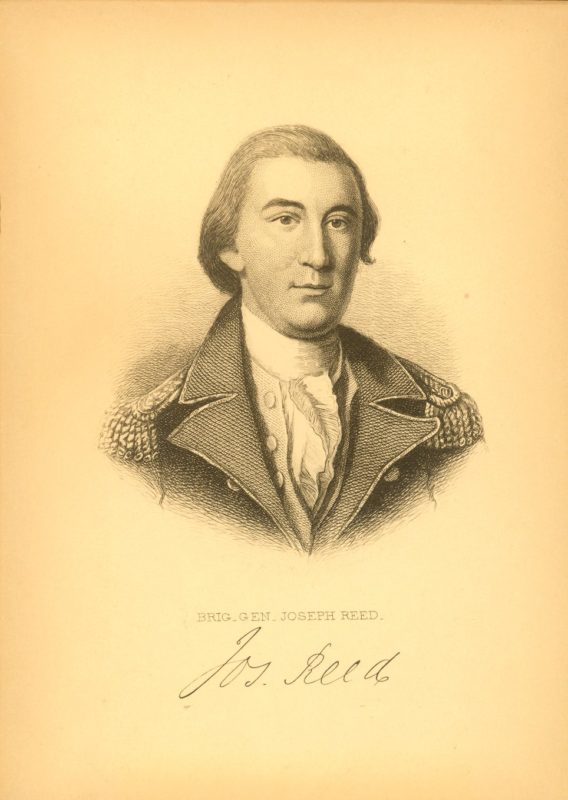Related Posts
- Buy Tickets for The Constitutional Walking Tour of Philadelphia – See 20+ Sites on a Primary Overview of Independence Park, including the Liberty Bell and Independence Hall
- Independence Hall
- Second Continental Congress
- America's Founding Fathers
- Benjamin Franklin - One of America's Founding Fathers
- Laurel Hill Cemetery
- Philosophical Hall
- George Washington - One of America's Founding Fathers
Birth: August 27, 1741
Death: March 5, 1785 (age 43)
Colony: Pennsylvania
Occupation:Lawyer, Soldier, Politician
Significance: Signed The Articles of Confederation (at the age of 36); served as a member in the Continental Congress(1778); served as the President of Pennsylvania (1778-1781)

Joseph Reed was one of the Founding Fathers of the United States. Born in Trenton, New Jersey, Reed moved to Philadelphia as a child before returning to New Jersey in order to attend Princeton University. After graduating from Princeton in 1757, Reed traveled to London to attend Middle Temple and continue his studies as a lawyer. Following the completion of his education, Reed moved back to Philadelphia where he was named a member of the American Philosophical Society, America's first scholarly society, founded by fellow Philadelphian and Founding Father, Benjamin Franklin.
Reed worked as a lawyer in Philadelphia, while also becoming involved in politics. As the conflict between the American Colonies and Britain started pushing toward the Revoutionary War, Reed was a vocal supporter of the revolutionary cause, as was his wife, Esther de Berdt Reed.
This was despite the fact that Reed had met Esther in London, and she had just recently moved to the American Colonies following her marriage to Reed. Esther started the Ladies Association of Philadelphia to raise money in support of the Revolutionary War. Reed joined Philadelphia's Committee of Correspondence and served as the President of Pennsylvania's Second Provincial Congress.
In April of 1775, Reed left his legal career at the urging of George Washington to become Washington's secretary and aide-de-camp. Reed joined the Continental Army as a Lieutenant Colonel and traveled North with Washington, where Washington was to take command of the newly formed Continental Army. Reed rose to the rank of Adjutant-General, and he became a trusted confidant of Washington. However, Reed damaged Washington's trust in him when Washington discovered a letter from the Continental Army's Second Major General, Charles Lee, in which the two men discussed their dwindling faith in Washington's abilities following the Continental Army's' defeat in New York. Although Reed had lost Washington's trust, Reed continued to serve in the Continental Army.
Reed left the Continental Army in 1778 after he was elected to serve in the Second Continental Congress. While in the Continental Congress, Smith was among the first signers of the Articles of Confederation on July 9, 1778 after the Articles were ratified by his Colony of Pennsylvania.
While serving in Continental Congress, Reed was also elected as the third President of Pennsylvania, a position analogous to the present day position of Governor of Pennsylvania. Reed served as the President of Pennsylvania until 1781, and he was influential in organizing Pennsylvania's efforts during a critical period of the American Revolution. To that end, Reed also signed into law the Gradual Abolition Act of 1780, which began the process of ending slavery in Pennsylvania. It was the first extensive piece of legislation designed to end slavery that was signed into law in the United States.
After serving as President of Pennsylvania, Reed fell into poor health. Reed traveled to London in 1784, shortly after the end of the Revolutionary War in an attempt to find a cure for his poor health, but Reed returned to Philadelphia still in poor health and died shortly thereafter in 1785 at the age of just 43. Reed is buried in Laurel Hill Cemetery.
Joseph Reed in Philadelphia
Joseph Reed lived in Philadelphia for much of his life. Reed mostly grew up in Philadelphia and after completing his education abroad, Reed returned to Philadelphia to start his legal career. While in Philadelphia, Reed was a member of the American Philosophical Society which met at Philosophical Hall. Reed also served as a Delegate to the Second Continental Congress in Philadelphia. While serving as a member of the Second Continental Congress, Smith worked at Independence Hall, where he signed The Articles of Confederation. Reed also worked within Independence Hall while serving as the President of Pennsylvania.
Today, Reed in buried in Philadelphia at historic Laurel Hill Cemetery, and Reed Street, which runs through South Philadelphia, is named after Reed. Independence Hall and Philosophical Hall are some of the stops visited along The Constitutional Walking Tour!



